Twelfth Night
Ye Olde Christmas Season, Epiphany Parties, & When to Take Down the Christmas Tree
Longtime readers will know that I often write about history and holiday traditions, as well as gardening and food preservation. Farming our little patch of suburbia has helped me to connect with the earth’s seasonal rhythms and to appreciate the agrarian calendar that defined humanity’s relationship with nature for so many centuries. If you prefer to read the posts on growing crops, keeping bees, and relearning homesteading skills, please do check out these posts from May on the mini-orchard, June on planting in drought, and September's harvest inventory.
Brush up your Shakespeare
Ending the 12 days of Christmas with a party on January 5th or 6th has illustrious historical and literary roots. The Bard’s play Twelfth Night is so named because it was commissioned by Queen Elizabeth I to be performed as part of the merry-making that ended the Christmas celebrations in 1602. The play is full of topsy-turvy hilarity, its story lines driven by mistaken identity, gender switching, and status swapping. If you need a refresher or an introduction to this play, I’d recommend this quick summary:
The role flipping that defines Shakespeare’s play reflects the popular Twelfth Night party theme that lasted centuries: Disorder or Misrule, in which servants ordered about their employers, the party was lorded over by whomever pulled the bean out of the cake, mischief and practical jokes took the place of conventional etiquette, and general rowdiness ruled the night. This “Feast of Fools” had its glory days in Tudor England, its time of tribulation under Cromwell (when a Puritan parliament banned Christmas celebrations), reached another zenith in hedonistic Georgian England (Jane Austen reportedly attended a Twelfth Night party at which she went about as a character who told everyone exactly what she thought of them— perfection!), and was finally outlawed by Queen Victoria (possibly under economic pressure from industrial bosses who wanted a shorter workers’ holiday).
Bearing gifts, we traverse afar
The holiday is Epiphany, or Three Kings Day, in the Christian liturgical calendar. It commemorates the visit of the Magi to the Christ child. While I’ve focused on its Anglo cultural history, the day has many rich customs in other countries. Puerto Ricans celebrate the feast with parades that include the 3 Kings on horseback and outdoor festivals that draw tens of thousands. The French have marzipan cake with a toy baked in. In some German towns, people gather together to burn their Christmas trees. In many Eastern Churches, it is a popular day for baptisms. Epiphany has traditionally been celebrated by gift-giving, which we do in our family. It’s a great reason not to sweat when a package is delayed or when you wait to buy something when it’s on sale after Christmas— you can always just say that gift is for January 6th!
Epiphany Party
Back when our children were younger and we were just getting started with incorporating liturgical feasts into our home, we started hosting a big friend party to celebrate the 12th day of Christmas. There were some practical benefits to throwing a party a week into January. We were able to increase the attendance rate, since most holiday parties occur before Christmas nowadays. Hence, we weren’t competing with the multitude of December events. People were usually rested after their family celebrations and up for a low-key social gathering. There was no pressure on the guests to exchange gifts or cook; we provided party favors for the children and bringing a dish to pass was strictly optional. We served hearty fare like roast turkey and root veggies, and liquid cheer in the form of buttered rum and hot chocolate. And no need to find a babysitter, as kids were welcome and expected.
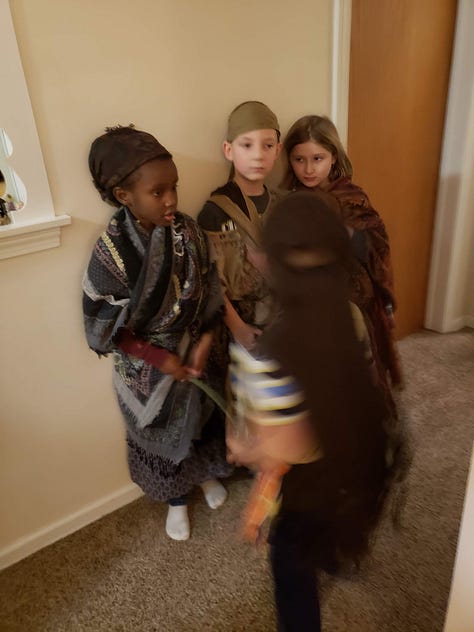
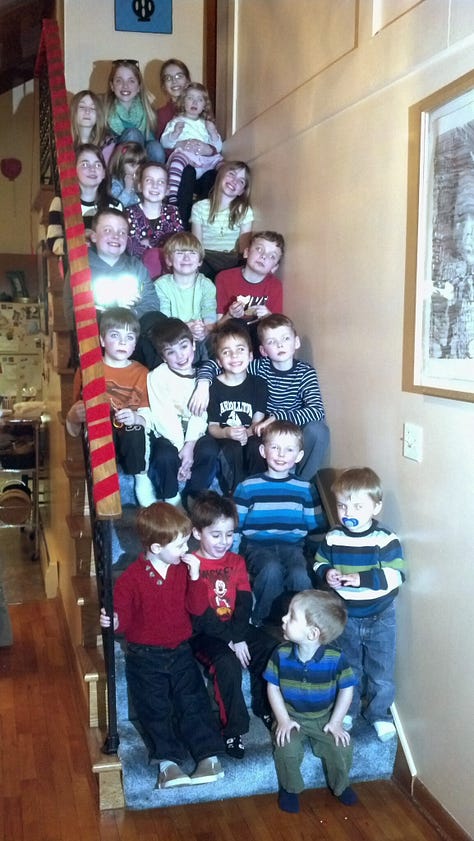
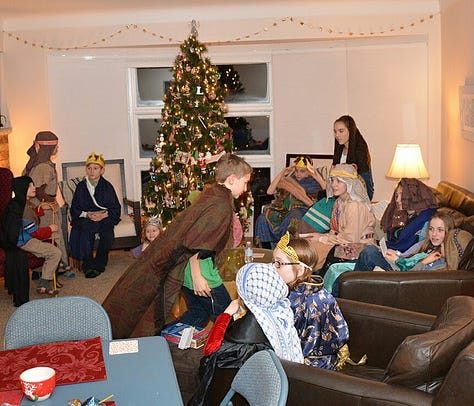
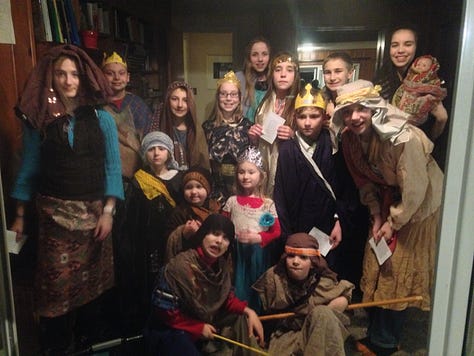
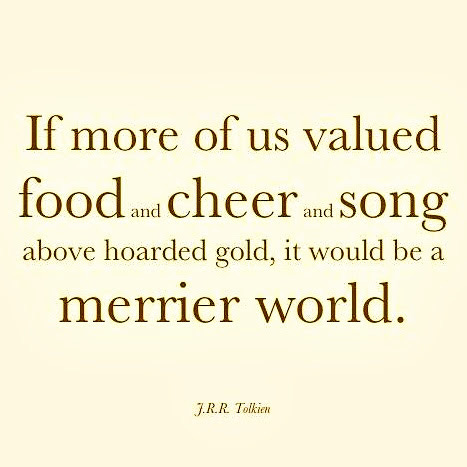
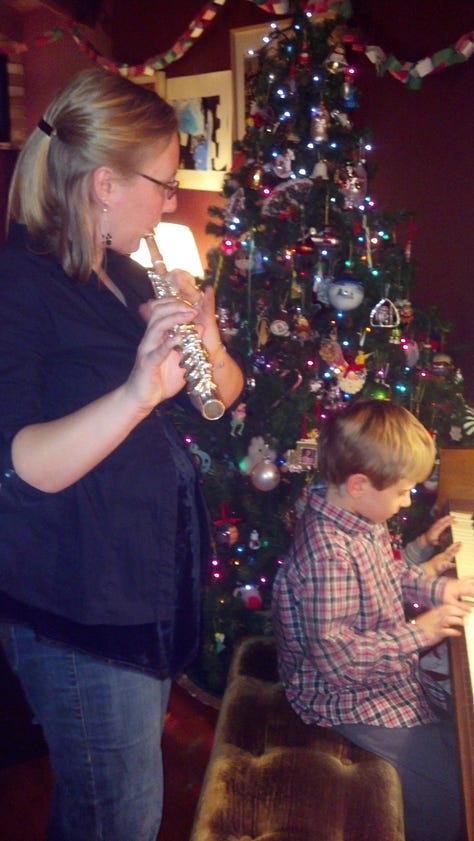
The theme was Food, Cheer, & Song (nod to Tolkien) and while we didn’t push the religious element, we didn’t bury it either. I collected costumes and wrote out a script on index cards for the kids to perform a Three Kings pageant, and anyone who played an instrument or wanted to sing joined in for carols. Other activities that worked well: Pictionary played on a white board with dry erase markers, card tables and games in a separate room for the middle schoolers, and soft cotton “snowballs” to throw at a papier mache reindeer while blindfolded. We haven’t hosted an Epiphany party since 2019, and most of the kids who attended are now young adults. But we have great memories from those parties (as we hope those readers who were in attendance do, too), and I’d highly recommend as an event worth hosting. Part of bringing more feasts back into our lives and communities.
O Christmas Tree
While we can blame Queen Victoria for the loss of Twelfth Night raucousness, we can thank her (& the German Prince Albert) for the popularity of the Christmas tree. They became all the rage here in the U.S. after an 1850 woodcut of the British royal family gathered around their tree was published stateside in a women’s magazine. At which point the German immigrants who’d been putting up fir trees in their houses every Christmas weren’t so much the neighborhood weirdos anymore.
Are you Team Real or Team Artificial Christmas tree? Do you have staunch views on when the tree should go up and come down? If so, vote below!
We put up our Christmas tree sometime during December, strung with lights, and hang the ornaments on it the week prior to Christmas. We use an artificial one because of a child with allergy to pine trees. The earliest we undecorate and dismantle the tree is after said child’s mid-January birthday, because she likes to wake to presents just for her under the tree that day. The latest it’s been left up was mid-March, after having served as a Valentine’s and St. Patrick’s Day tree, bedecked with shiny cardboard hearts, then shamrocks. The ideal for us is to leave it up until February 2nd, the old end to the Christmas season, which I wrote about here in this 2022 post.
Would you throw a party for Twelfth Night? If so, would it reflect all manner of misrule, as it did in England and in the northern American colonies, or a more genteel or chill affair to mark the extended Christmas season? Whether you celebrate Christmas or not, I would love to here about your December/ January traditions! For those who do celebrate, Merry 4th day of Christmas to you and yours! May your New Year be bright, no matter if your Christmas tree is still up or not as the clock strikes twelve.
—Erin, in Michigan





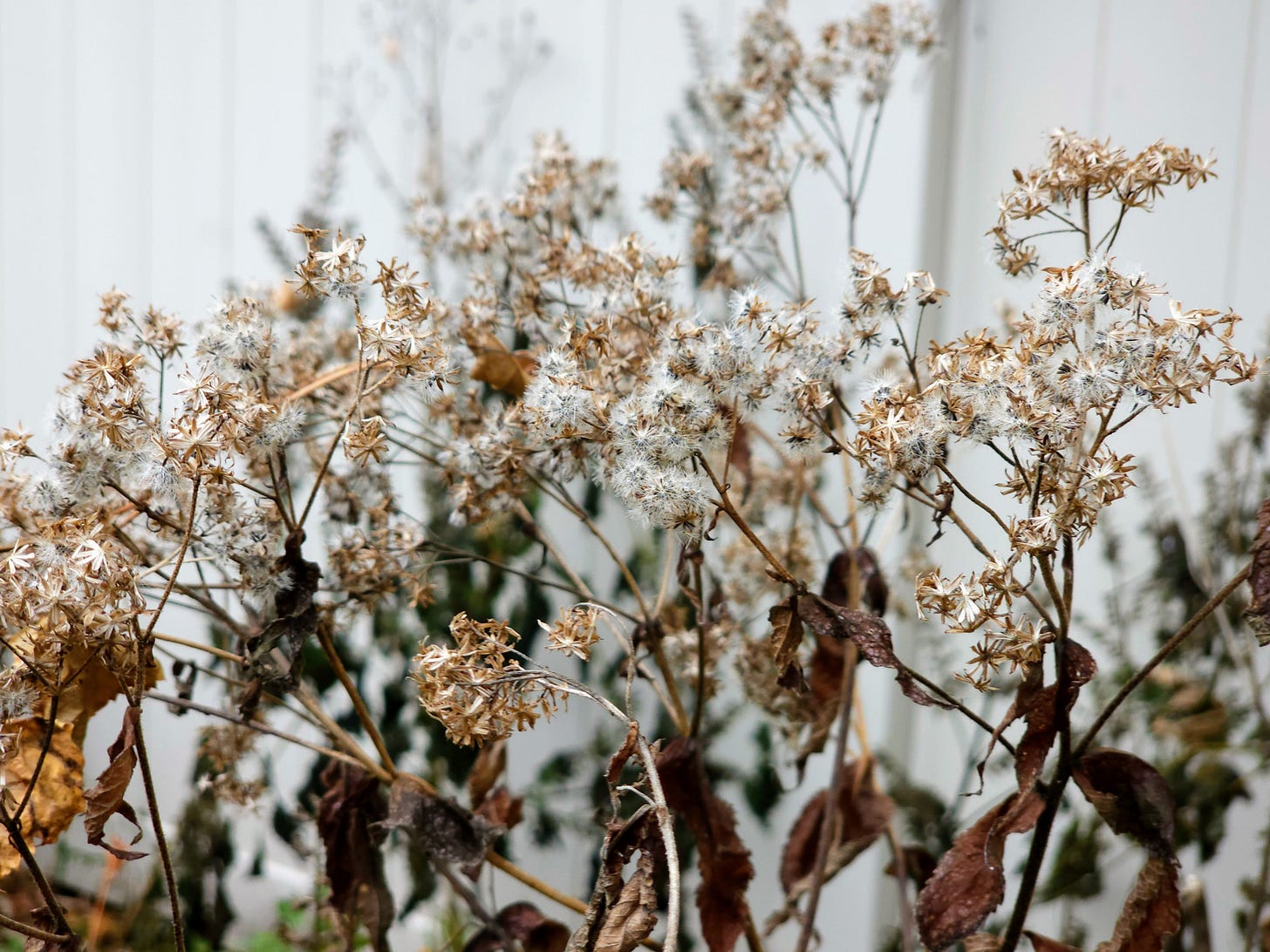
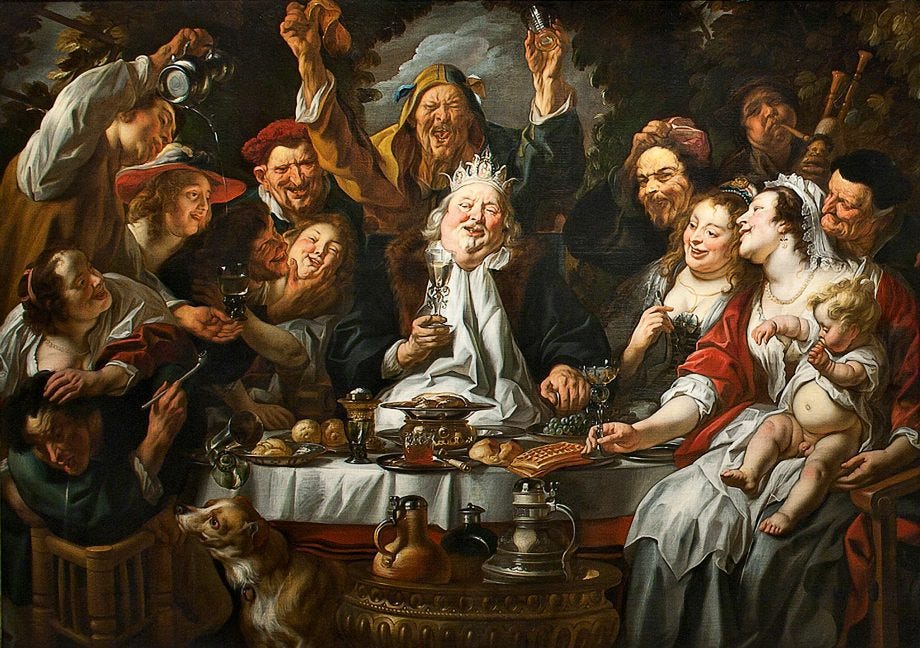
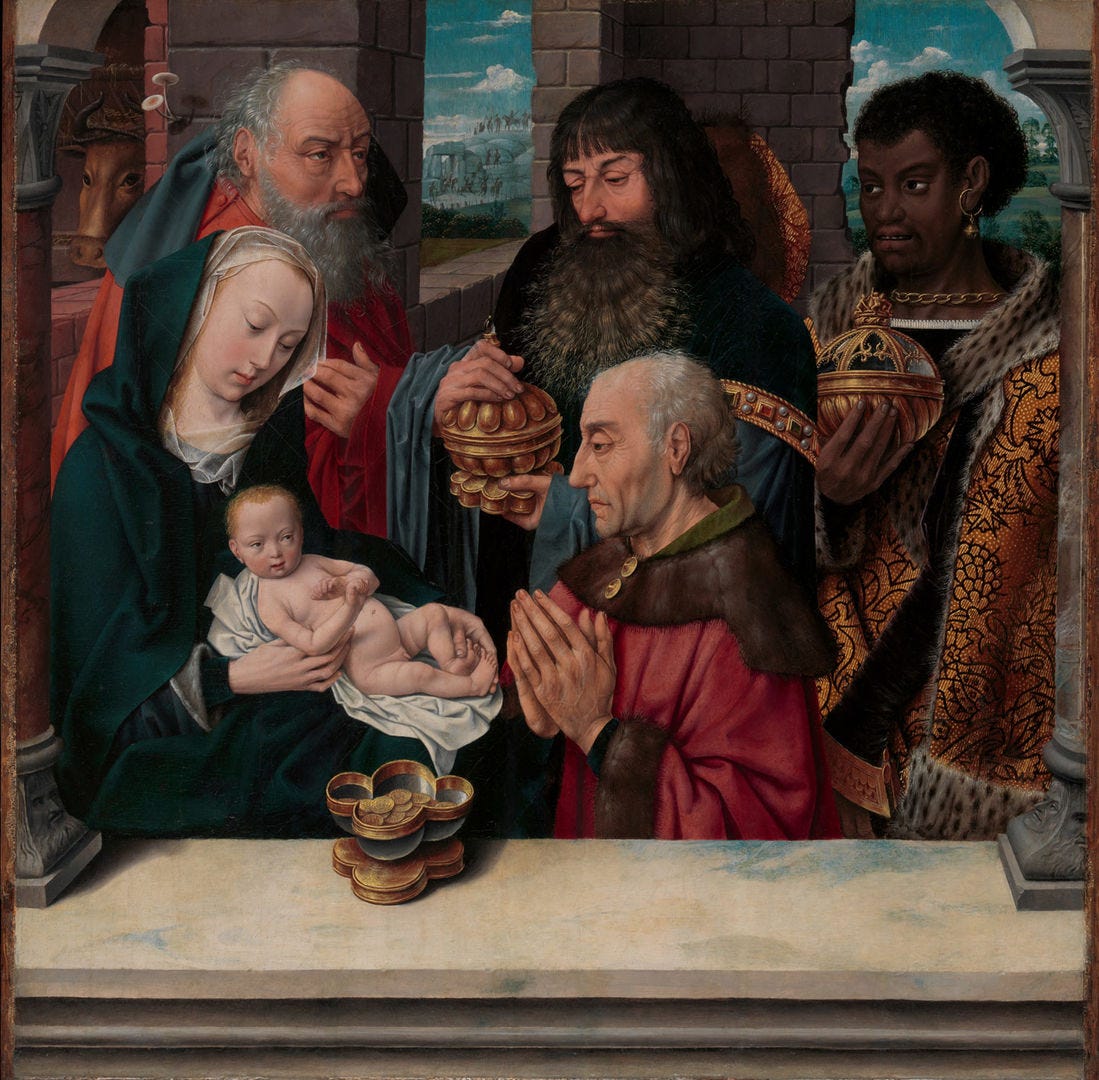
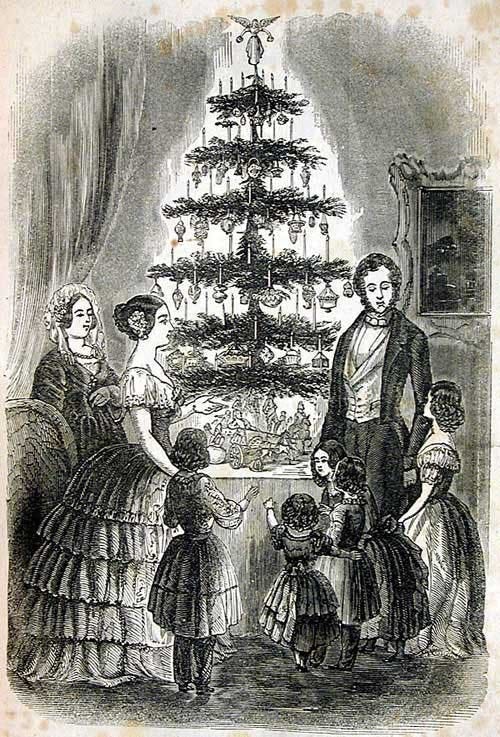

I am fascinated to learn about the influence of Queen Victoria on the Christmas Tree's American popularity; I always assumed everybody else was jealous of all the fun the German immigrants were having with theirs! What a lovely woodcut and portrait of familial Christmas Bliss in the early days of the "Victorian Era" before people thought of it as such!
Oh Erin, I wish we could all celebrate Epiphany together - those pictures of your parties look like SO much fun!! And I really love the older tradition of keeping Christmastide until Candlemas...we do it somewhat step-wise, removing a lot of the Christmas things after Epiphany, but still leaving some greenery etc. up until Candlemas.
Our kids have grown to LOVE Epiphany and seem to have the rhythm embedded now - to the point that after Christmas comes, they start asking "When is Epiphany?!" We bake a cake (just hide M&M's inside it), and we've made a tradition of watching the "We Three Kings" scene from the old California Raisins Christmas special. 😂